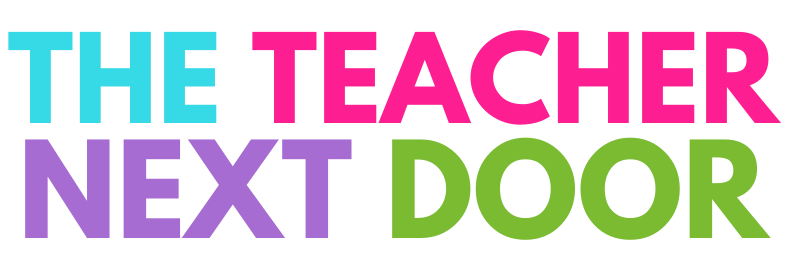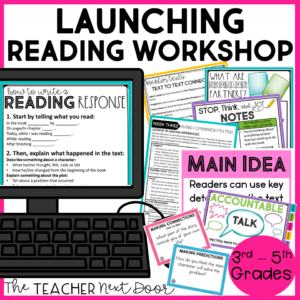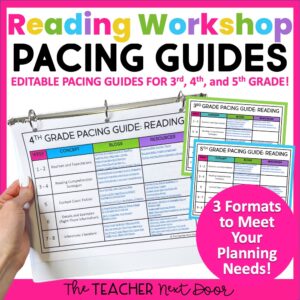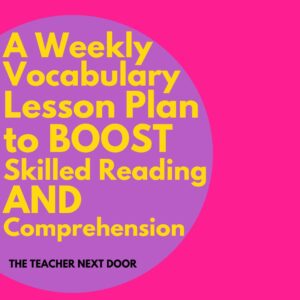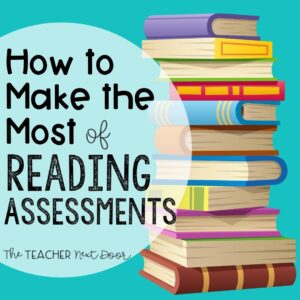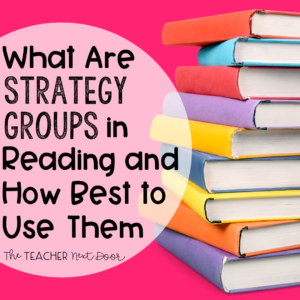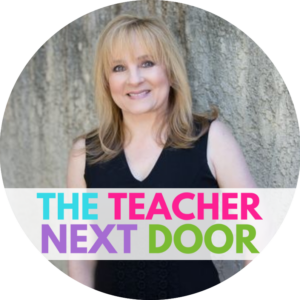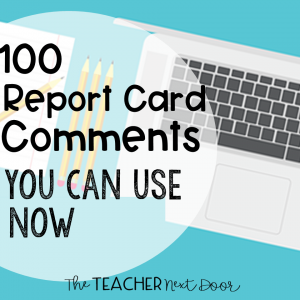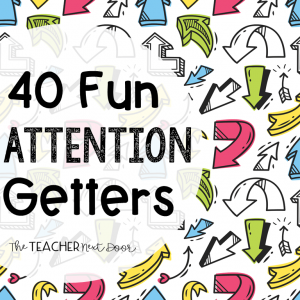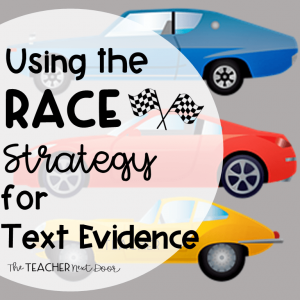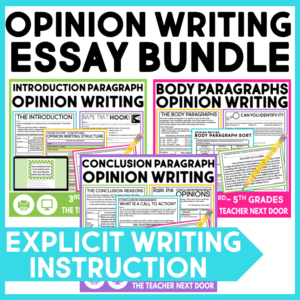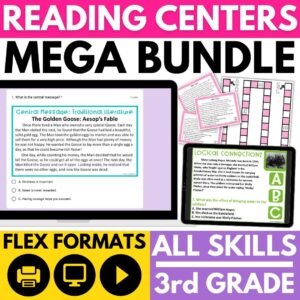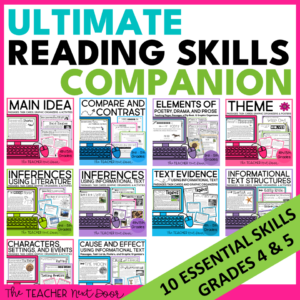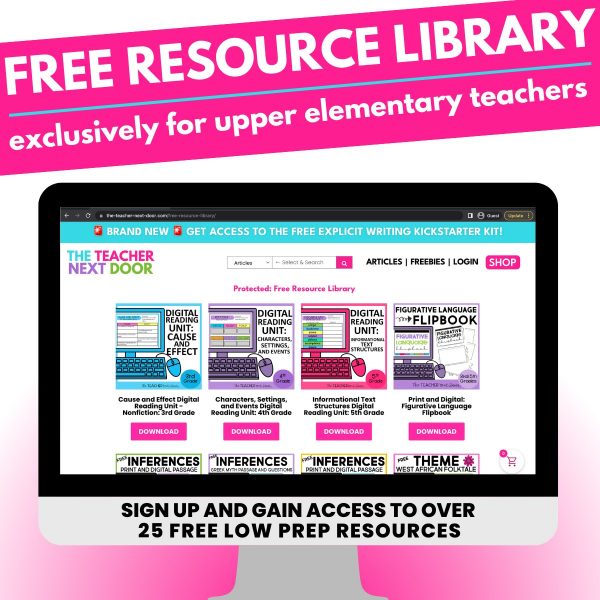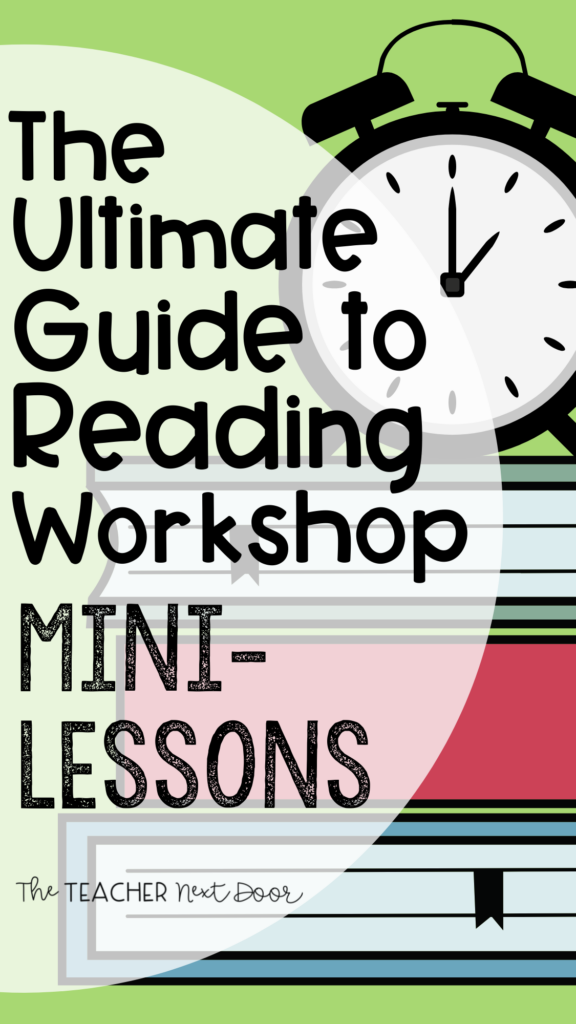
If you’ve been teaching reading using a Reading Workshop model, you already know that the mini-lesson is a key component!
This quick but oh-so-important part of Reading Workshop is where teachers teach a specific reading skill or strategy students need to learn or review.
What exactly do teachers do during the mini-lesson time?
I’ll share what I like to do here. Feel free to use these ideas or to tweak them to match your needs.
Preparing a Gathering Place for Mini-Lesson Time
One of the things you’ll want to consider is where students will gather for mini-lesson time.
While classroom size is never large enough, you’ll still need to carve out a meeting area with room for the whole class to sit comfortably.
Mine has a futon, a few plastic Adirondack chairs my neighbor discarded, and an area rug.
We have designated spots for each of the “prime seating” locations (futon and chairs) which rotate based on my helper chart, so there’s never a question about who sits there.
The rest of the students sit on the rug, so everyone can see me. Sitting in close proximity to me helps reduce behavior issues and also makes it easy for reading partners to pair-share whenever needed.
Sitting in a designated area also allows students to see the Smartboard where I sometimes project anchor charts.
For classrooms without a SmartBoard, you’ll probably want to have a way to display anchor charts. Anchor chart stands or using magnets or clips to attach them to the whiteboard works well.
Additionally, I like to use anchor chart printables, so students have a copy of the mini-lesson to add to their reader’s notebooks and use as a reference.
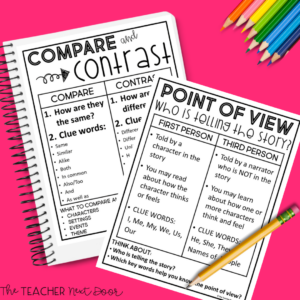
Starting a Mini-Lesson
Once students have gathered and you have their attention, you’ll want to connect today’s lesson to previous lessons.
Linking previous learning to the new learning might sound like this:
Remember when we…
Last time we met we…
Yesterday we talked about…
Directly State The Teaching Point
Stating the teaching point in a clear and concise way sets the stage for the lesson to come.
You’ll want to avoid using “standards type” of language but will tell students the single strategy, skill, or concept they’ll learn in kid-friendly language.
Sometimes I display a reading poster to reinforce what we’ll be learning.
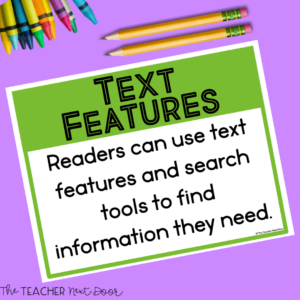
Stating the teaching point might sound like this:
Today we’re going to learn about…
Now we’ll be focusing on how…
Today I want to teach you…
Teaching the Reading Concept
The teaching part of a Reading Workshop mini-lesson is the most important part of the mini-lesson. It’s something that needs to be strategically planned in advance.
I know things sometimes happen, but teaching a mini-lesson is not the time to wing-it or to show-up unprepared if it can be helped.
The hard truth is that if the mini-lesson is not carefully thought-out, it will most likely not be as effective as it could be.
Even after teaching for so many years, it’s helpful for me to have key points of the lesson plans written down. This way I can give it a quick-read beforehand or glance down and know where to go if I need to.
The beauty of having lesson plans in long form like this is that once they’re completed, you can use these year after year and simply tweak them as needed.
Here’s an example of a mini-lesson plan I made for Making Predictions:
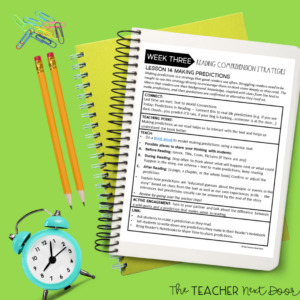
Besides making sure to prepare for the mini-lesson, you’ll want to make sure it is a “mini” lesson, which can be hard to do. The entire mini-lesson time should be short and sweet!
The entire mini-lesson should be about 10 – 15 minutes max (I know…it seems impossible at first), so the teaching part of the mini-lesson should be about only 6 minutes!!!
You can teach the reading skill or strategy in several ways:
- You can model the strategy being taught using a mentor text you’ve already read (give a quick reminder of the story and then re-read the related part of the book that supports your teaching point).
- You can use a think aloud to show students what readers might/should be thinking as they read.
- You can use an anchor chart – pre-made anchor charts do make this part more time-efficient.
- You could use some other creative way to teach that relates to the lesson.
To start the mini-lesson, you might say:
Let me show you what this looks like…
Watch me as I show you…
I want you to notice how…
Listen closely as I…
Let me show you what I mean…
Having Students Practice – Active Engagement in the Mini-Lesson
After finishing the “I do” part of the lesson, it’s time for the “we do” part. Students discuss or practice the skill alone or with a partner.
I do often have students bring books, reader’s notebooks, or whiteboards to the Reading Workshop meeting area depending upon the lesson for that day.
You don’t want to waste time having them go back to their seats to get materials.
Active engagement time might sound like this:
Turn to your partner and…
Now it’s your turn to try…
Read the first paragraph on your own to see…
Linking to Remind Students of the Teaching Point – Ending the Mini-Lesson
To close out the mini-lesson, you’ll want to reinforce the teaching point and tell students explicitly what you want them to do during independent reading time.
This is just a quick sentence with a reminder and a short directive.
It might sound like this:
When you’re at your reading spot today, make sure…
As you’re reading your own book today (and every day), don’t forget to…
That’s it! Now that you know the five parts of a mini-lesson, you’re ready to dive-in and start teaching!
Do remember that like everything, becoming skilled at teaching Reading Workshop (and mini-lessons in particular) takes time, patience, and practice.
The more you practice teaching using the mini-lesson model, the more confident and proficient you’ll become! You’ve got this!
If you’re thinking about diving into Reading Workshop, you can sure create everything you need, but if you’re looking for a set of time-saving, print and digital resources, I have a set ready for you.
It has 4 weeks of mini-lesson plans, plus anchor charts, graphic organizers, reader’s notebook materials, bookmarks, posters, and more!
Click here to take a look at the Launching Reading Workshop unit!
Now that you have a handle on how to teach mini-lessons, maybe you’re wondering how to plan for the year?
If you’d like to plan out the grade level reading skills and mini-lessons your students need for the year, I have a FREE Reading Workshop Pacing Guides for 3rd, 4th, and 5th grade that I’d love to share with you.
The pacing guides are organized by weeks and come in color, black and white, and in editable formats too, so you can tweak them to match your needs.
IF YOU LIKED THIS BLOG, YOU MAY ALSO BE INTERESTED IN:
- How Using Question Stems Changed the Way I Teach Reading
-
Graphic Organizers: 5 Simple Tips That Can Improve Student Learning
-
4 Super Simple Ways to Effectively Use Anchor Charts to Teach Reading Skills
- Everything You Need to Know About Launching Reading Workshop

